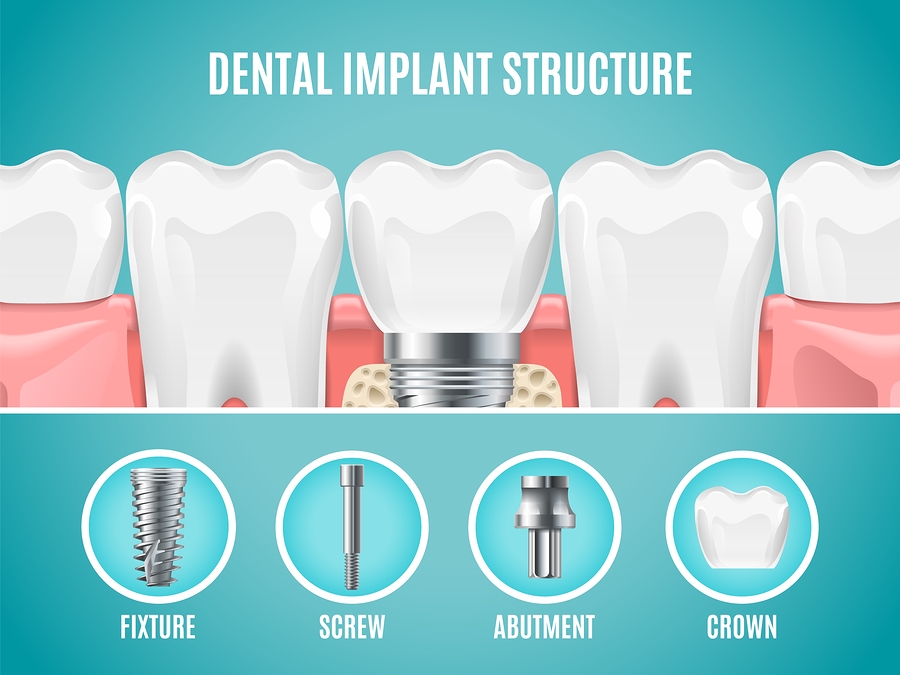The Best Strategy To Use For Dental Sense
The Best Strategy To Use For Dental Sense
Blog Article
What Does Dental Sense Do?
Table of ContentsThe Only Guide to Dental SenseThe 20-Second Trick For Dental SenseThe 45-Second Trick For Dental SenseSee This Report on Dental Sense
are clinical devices surgically implanted right into the jaw to recover an individual's capacity to eat or their look. They supply support for man-made (phony) teeth, such as crowns, bridges, or dentures. When a tooth is shed as a result of injury or illness, a person can experience complications such as fast bone loss, defective speech, or modifications to eating patterns that cause pain.Oral implant systems consist of a dental implant body and dental implant abutment and might additionally include a joint addiction screw. Root canal procedure. The oral implant body is surgically placed in the jawbone in place of the tooth's root. The oral implant abutment is usually connected to the dental implant body by the abutment fixation screw and extends through gum tissues into the mouth to support the connected artificial teeth
(https://ameblo.jp/dentalsense1/entry-12882048969.html)Framework of The Oral Implant System picking dental implants, talk to your oral supplier regarding the potential benefits and risks, and whether you are a candidate for the treatment. Things to take into consideration: Your overall health is a crucial consider establishing whether you are a good candidate for oral implants, how much time it will take to recover, and exactly how long the dental implant may stay in area.
Smoking may influence the healing procedure and decrease the long-term success of the implant. The recovery process for the dental implant body may take several months or longer, during which time you normally have a short-lived abutment in place of the tooth. the oral implant treatment: Meticulously follow the dental health guidelines offered to you by your oral service provider.
All About Dental Sense
Implant failing can result in the requirement for another surgery to deal with or replace the dental implant system. Brings back the capacity to eat Recovers cosmetic appearance Helps maintain the jawbone from reducing because of bone loss Preserves the health of the bordering bone and periodontals Aids maintain adjacent (close-by) teeth stable Boosts lifestyle Damages to surrounding natural teeth during dental implant placement Injury to the surrounding tissues during surgical treatment, such as sinus perforation Injury throughout surgery (for instance, fracture of bordering jawbone) Poor function, such as seeming like the teeth do not bite together normally A sensation that the tooth hangs or turning in location arising from an abutment screw loosening Implant body failure (looseness of the implant body) because of systemic infection, which might be most likely in clients with unchecked diabetes mellitus due to neighborhood infection in bone and periodontals supporting the dental implant body because of delayed healing, which might be extra likely in patients that smoke Trouble cleaning the gum tissues around the implant, resulting in inadequate oral health Untreated gum condition Post-surgical feeling numb due to nerve impingement or damage Always alert healthcare service providers and imaging professionals that you have dental implants before any magnetic vibration imaging (MRI) or x-ray procedures.
FDA is not mindful of any kind of adverse events reported for MRI or x-ray procedures with dental implants. Oral implants systems are typically constructed from materials that follow worldwide agreement criteria of the International Company for Standardization (ISO) or ASTM International. These standards have details of what makes a safe material.

An oral implant is a framework that changes a missing out on tooth. With screw-like gadgets, the specialist inserts an implant right into the jawbone, and it serves as a support for a man-made tooth, called a crown. A device called an abutment links the synthetic tooth to the dental implant. The crown is personalized to fit the person's mouth and match the shade of their teeth.
Indicators on Dental Sense You Should Know
Some individuals are not eligible for dental implant surgery. It is for oral cosmetic surgeons to operate individuals with: severe illnessuncontrollable metabolic diseasebone or soft cells disease or infectionIf these issues are resolved, an individual can have the surgery. In, dental specialists abstain from operating people with: If individuals with any one of the above undertake oral implant surgical treatment, there is a greater threat of the dental implant failing.

Oral dental implant surgery is a customized process. Give you time to heal. Connect the message and last crown, bridge or denture.
Next off, your cosmetic surgeon will very carefully position the oral implant into your jaw. Lastly, your cosmetic surgeon will certainly reposition your gums and shut the incision with stitches. If your implant is near the front of your mouth, your dentist will make a momentary tooth for you to use till you heal. In this way, you won't have a gap in your smile while you recover.
Dental Sense Things To Know Before You Get This
During the healing stage, your jawbone must fuse to the dental implant. This procedure can take anywhere from three to nine months.
As soon as your implant heals, your dentist can attach the joint (little connector message) and your final reconstruction (crown, bridge or denture). This normally takes concerning one hour to complete and may require a 2nd minor surgery. You shouldn't feel any type of pain throughout your dental implant treatment due to the fact that your service provider will use drug to numb your periodontals.
Report this page